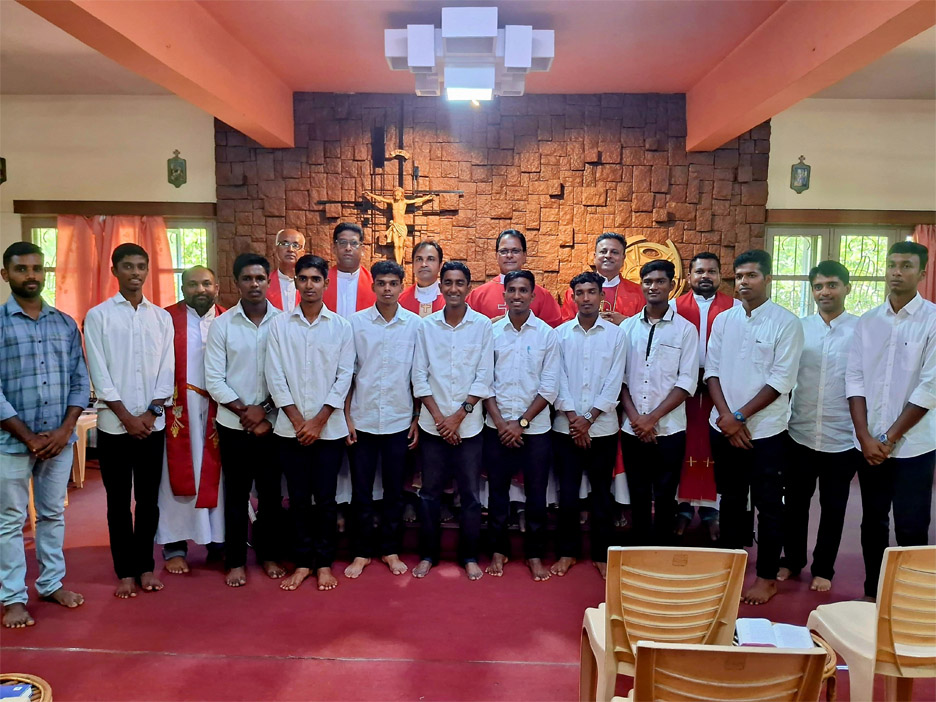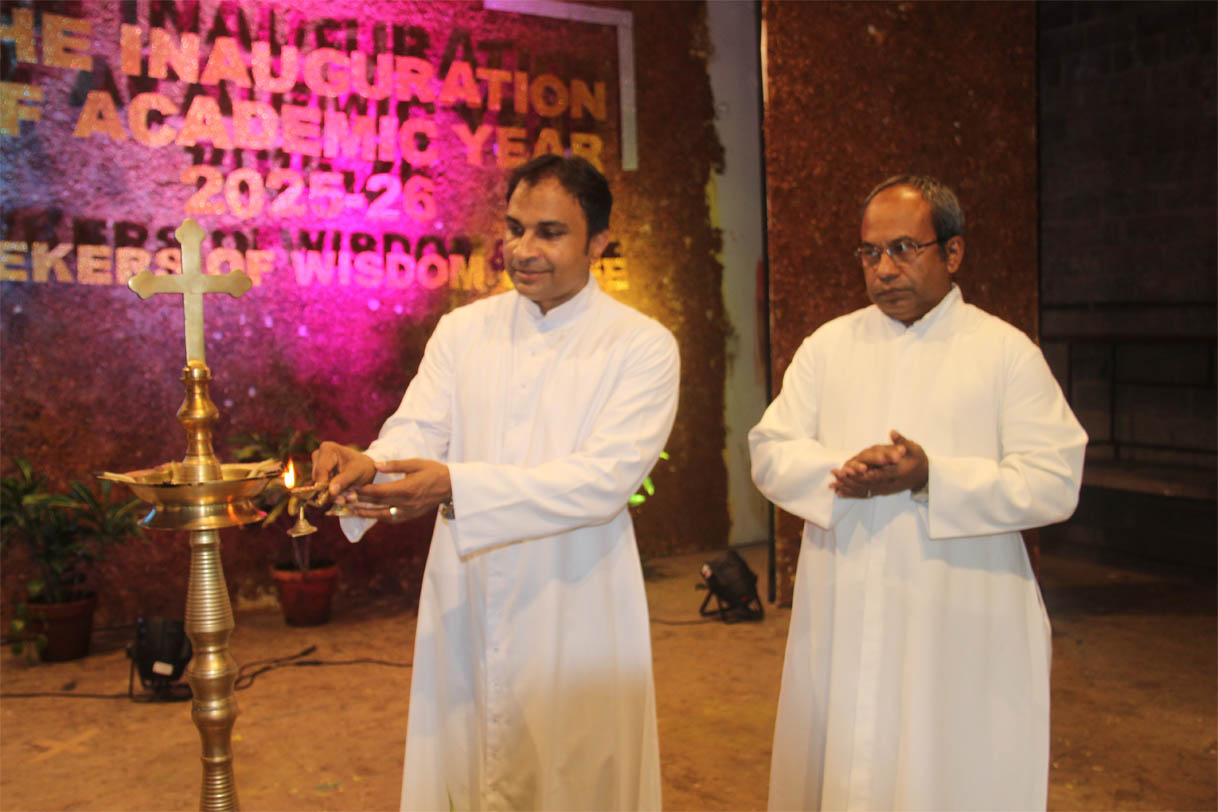

SAINT JOSEPH THE WORKER, A DILIGENT EXAMPLE AND MODEL OF WORK
The Feast of St. Joseph the Worker was celebrated on 1st May – a day on which the Church focusses its attention on Saint Joseph, a diligent example and model for workers. The feast was instituted by Pope Pius XII in 1955 to foster a deeper devotion to Saint Joseph among the Catholics, and as a response to the “May Day” celebrations for workers sponsored by the communists. Much more than a reaction against rival ideologies, this feast promotes and defends the dignity of human work under the patronage of St. Joseph.
The Dignity of Work
The Church teaches that everyone has a right to work and that there is great dignity in work. But the crucial difference between the Church’s view of work and various secular philosophies is that the Church sees the dignity of work as having its source in the inherent dignity of the human person, and not vice versa. As St. John Paul II so succinctly put it, “Work is ‘for man’, not ‘man for work’” (Laborem Exercens, 6). The Church celebrates the value and dignity of human work because it is done by human persons.
The Church reiterates that every person has the right to a work that matches one’s dignity as a human person and that allows one to provide for one’s needs and those of the family. This doesn’t mean that any person has a right to any job they want regardless of qualifications, merit, etc. But it does mean that unemployment is more than a merely practical problem – it’s a human rights issue. As the Catechism of the Catholic Church puts it, “Unemployment almost always wounds its victim’s dignity and threatens the equilibrium of his life. Besides the harm done to him personally, it entails many risks for his family” (CCC 2436).
Saint Joseph, an Example of the Holiness of Human Labour
Beginning with the book of Genesis, the dignity of human work has been long celebrated as a participation in the creative work of God. The Catechism of the Catholic Church teaches, “The sign of man’s familiarity with God is that God places him in the garden. There he lives ‘to till it and keep it’. Work is not yet a burden, but rather the collaboration of man and woman with God in perfecting the visible creation.” (CCC #378). By work humankind both fulfils the command found in Genesis to care for the earth (Genesis 2:15) and to be productive with their labour. Saint Joseph, who in the Bible is recognized as a just man, is one who reveals with his own life that God the Father works and through Him work is sanctified. Saint Joseph, the carpenter and father of Jesus, is but one example of the sanctity of human labour. We can say that work is a path to sanctification to which men and women must adhere in order to contribute to the growth of the society; for it is part of the cultural evolution of man, throughout history.
Little wonder Saint Paul exhorts, “Whatever your work is, put your heart into it as done for the Lord and not for human beings, knowing that the Lord will repay you by making you his heirs. It is Christ the Lord that you are serving” (Col 3, 23-24). Sadly, in the society today, we are faced with many difficulties arising from the world of work – unemployment, injustice, slavery, dehumanization and laws that do not benefit workers. Living as we are in a materialistic society which divides people by the type of work they do, and which values the human being for what he is capable of producing, the Church reminds us of the dignity of work by setting St. Joseph as an example of one who laboured diligently for the good of his family and society.
Jesus too was a carpenter (Mk. 6:3). He learned the trade from his father, Saint Joseph, and spent his early adult years working side by side in Joseph’s carpentry shop until the commencement of his ministry. In his encyclical Laborem Exercens Pope John Paul II stated: “The Church considers it her task always to call attention to the dignity and rights of those who work, to condemn situations in which that dignity and those rights are violated, and to help to guide social changes so as to ensure authentic progress by man and society.” Saint Joseph is given to us by the Church as a model of such work. Pius XII emphasized this when he said, “The spirit flows to you and to all men from the heart of the God-man, Saviour of the world, but certainly, no worker was ever more completely and profoundly penetrated by it than the foster father of Jesus, who lived with Him in closest intimacy and community of family life and work.”
Don Bosco and Work
Don Bosco wanted the Salesians to work because God has commanded us to do so: “cultivate and guard the garden” (Gen 2:15). He was above all impelled by the example of Jesus, the divine worker of the house of Nazareth. “Jesus began to do and teach” (Acts 1:1): this is what he proposed to his sons when he wrote the Constitutions. In the second article he penned: “Jesus Christ began to do and teach, so too, the members will begin by perfecting themselves in the practice of the internal and external virtues.” (Peter Brocardo, Don Bosco. Deeply Human Deeply Holy, 105).
Don Bosco believed that work is an antidote to idleness and sin. One day the good Marquis Fassatti, one of the good friends of Don Bosco, felt sorry for him and for his followers because they were kept so busy by a thousand demanding enterprises. Don Bosco told him: “I must admit, we are loaded with wok, and it does take all we have got, some might even collapse under the strain of so much work. But I noticed that, thanks to this unceasing labour, all is fine in our houses, good spirit is ever flourishing, and plenty of good is done to souls… One of the best guarantees of flourishing religious spirit as well as of individual progress is the atmosphere of work proper to the houses. Work brings progress and prosperity in society” (A. Auffray, Climbing behind a Dependable Guide: A Sketch on Don Bosco’s Spirituality,12). Many a time Don Bosco was asked, “Which one should we sacrifice: prayer or work?” “Neither of them”, he would answer, “work intensely and pray more abundantly.”
The Characteristics of Our Work as Salesians
Work is the cornerstone of Salesian life. Don Bosco was a tireless worker and he wanted his religious to be tireless workers too. He would say, “Work like a good soldier of Christ.” Don Bosco understood work in its apostolic, charitable, manual, intellectual and humanizing dimensions. He saw the need of work to save souls and he provided both for the unceasing apostolate required to meet the needs of our times and for prayer so necessary to fortify the modern apostle against temptations and to protect his spiritual life from invasions of material activities. In this way he did not hesitate to make it a mystical ladder to God. (Peter Brocardo, Don Bosco. Deeply Human Deeply Holy,104-105).
A few months before Don Bosco’s beatification Pius XI, brought out the double aspect of his spiritual life. He said: “His was indeed an admirable life, because of both his action and his prayer. In fact, this is one of the Saint’s greatest characteristics, to be constantly busy with all sorts of activities to answer the need of his time; yet, he kept his spirit so elevated as to remain imperturbably serene and calm in such a way that his work became an effective prayer. For him to work is to pray.” His interior life led him to apostolic activities and his apostolic activities strengthened his interior life (MB XIX:217). For us Salesians work must be spontaneous, creative and enthusiastic in communion with other members of the Church. According to Fr. Caviglia, when something needs to be done, it is a Salesian heresy to say, “It is not my concern”; rather we should say, “I shall do it”. Our work must be done according to the needs of the time, in cooperation with others, with zeal and great joy. “Serve the Lord in gladness.” At the end of the annual retreat of the Rectors at Lanzo Don Bosco explained what type of work ought to be done in the houses: “In our houses, we do an awful lot of work, but this is not enough! We must moreover, always work for God and keep our minds elevated towards Him.”
Conclusion
In our time, when it often seems that selfish pride and ego reign supreme in society, when looking good on your social media profile is more important than doing good works in the world, the feast day of St. Joseph the Worker becomes more significant than ever. It gives us the chance to acknowledge the dignity of work, the great humility it can teach us, and the way it can bring us closer to God. This is embodied in no one as much as St. Joseph, the man who taught Christ how to work. Like St. Joseph who worked diligently, humbly and silently in his carpentry shop to provide for the Holy Family, we too are called to work in humility and diligence for the greater glory of God. St. Joseph, the just man, the example of the just and upright man in the work place teaches us that quality work – coupled with the virtues of prudence, fortitude, justice and temperance, along with charity and a supernatural outlook – builds up the Body of Christ. May the inspiration of St. Joseph the Worker and Don Bosco our Father and Founder enable us to work strenuously and diligently to fulfil God’s plan in carrying out our mission.
-
LENT: A JOUR...
29 March 2025 -
“ANCHORED IN...
14 February 2025 -
JUBILEE 2025...
08 February 2025 -
THE BIRTH OF...
08 January 2025 -
MONTH OF NOV...
13 November 2024 -
REDISCOVERIN...
13 October 2024 -
SYNODALITY A...
13 September 2024 -
INDEPENDENCE...
04 August 2024 -
THE SACRED H...
04 August 2024 -
THE SPIRITUA...
04 August 2024










